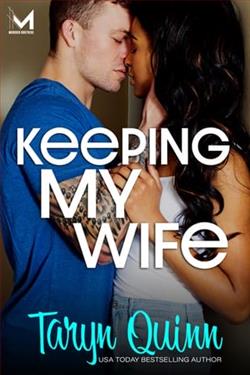Page 45 of The Executioners Three
By the time they’d backed out of the driveway in his Silverado, Freddie had managed to offer a slightly coherent explanation of Mrs. Ferris’s behavior—and Steve had also started to panic along with her. “She’s always been kooky, but this could get her killed. The trail entrance is almost a mile away, and people drive really fast on that road.”
Freddie nodded. She wanted to puke. Her gut was screaming at her to hurry. That she was probably already too late.
She couldn’t stop thinking of her dreams from the night before. And while sure, she knew dreams were not reality (because life was notThe X-Files), dreamsweremanifestations of real-life fears rooted in real-life problems.
A problem such as Mrs. Ferris heading toward a forest where someone had been murdered.
In a squeal of tires and a cough of exhaust, Steve veered onto the main road. Freddie strained to see ahead, but all the blips of light beneath the streetlamps were empty. There was no one on the road, and soon enough the truck had zoomed the full mile to where the trail began.
But still Mrs. Ferris was nowhere to be seen. Steve yanked up his parking brake, and the truck sputtered into silence before the trail’s shadowy entrance. “She probably went down there.” He kicked open his door and hopped out. He had to yell over the wind. “I’m going to look for her, and I want you to call Rita!”
Freddie nodded. “Be careful!” she shouted, already plugging in the number to the police station—and cursing herself for not having done so sooner. She wasn’t used to having Sabrina.
“Pick up, pick up, pick up,” Freddie murmured, her knees bouncing like crazy. “Pickup!” No one did. She got the station answering machine.
Which left her calling 911.
Yet before she could hit Send on that call, her phone screen lit up.
Steve.
“Yeah?” she said after hitting the answer button.
“I found her, Fred.” Wind roared into the phone. “She’s unconscious, just beyond the tree line. Someone… or somethingattacked her.”
Freddie’s breath choked off. “I’ll call nine-one-one right away.”
“Do it. And let’s hope we’re not too late.”
RISING
Theo Porter wasn’t in the mood to watch his fellow students get drunk again. Yet here he was on the lakeshore, sitting on a piece of driftwood, freezing off his ass, and wishing he hadn’t come.
Every one of these people—Davis, Kelly, Mark, Tiana, and all the rest—had gotten arrested last week. Yet not a one of them seemed to care, because their rich parents could wipe their records clean with a bit of cash.
Theo didn’t have cash. In fact, the school was currently reviewing his scholarship, and any day now, he was going to find himself back in Chicago. Back in his dad’s crappy apartment with the weight of the mysterious favors his dad had called in to get Theo a full ride at Allard Fortin.
It would all have been for nothing.
And that was just one more crappy thing: if Theo moved back home, then it would be the final proof that he was a screwup. Ever since Mom had died, he and Dad had both been stuck on this one-way train to ever-expanding failure. This would be that final shred of proof.
Because no way in hell was Theo going to get a full ride to the Northwestern journalism program now—not with this arrest record to haunt him.
Madison joined Theo on the log. The wind off the lake pulled at her thick corkscrew curls. Her skin, almost as dark as the sky overhead, gleamed beneath the moon. She had the tolerance of someone twice her size, and the one bottle of grain alcohol that Garrett had brought was, apparently, not doing the trick. She looked as pissed as Theo was about being here.
“Cigarette?” she offered, holding out a box of cloves.
“Sure.” Theo didn’t like smoking, but sometimes, you just needed something that killed you a little.
She lit it for him, and together, they sucked their lives away. It burned Theo’s throat. Clove-flavored death.
“Not drinking tonight?” Madison asked, eying the ruckus twenty feet away. Davis had insisted on a small bonfire, even though Theo had told him it was a mistake.
“No.” Smoke twined between his teeth as he spoke. “Not tonight.”
“Not feeling it?”
“No,” he said, even if that wasn’t true. He’d worked hard to cultivate an image. He was one of them; he belonged here; he too lived a life free from consequence.















